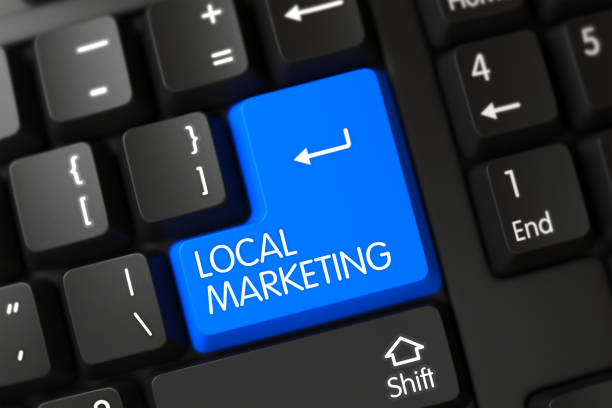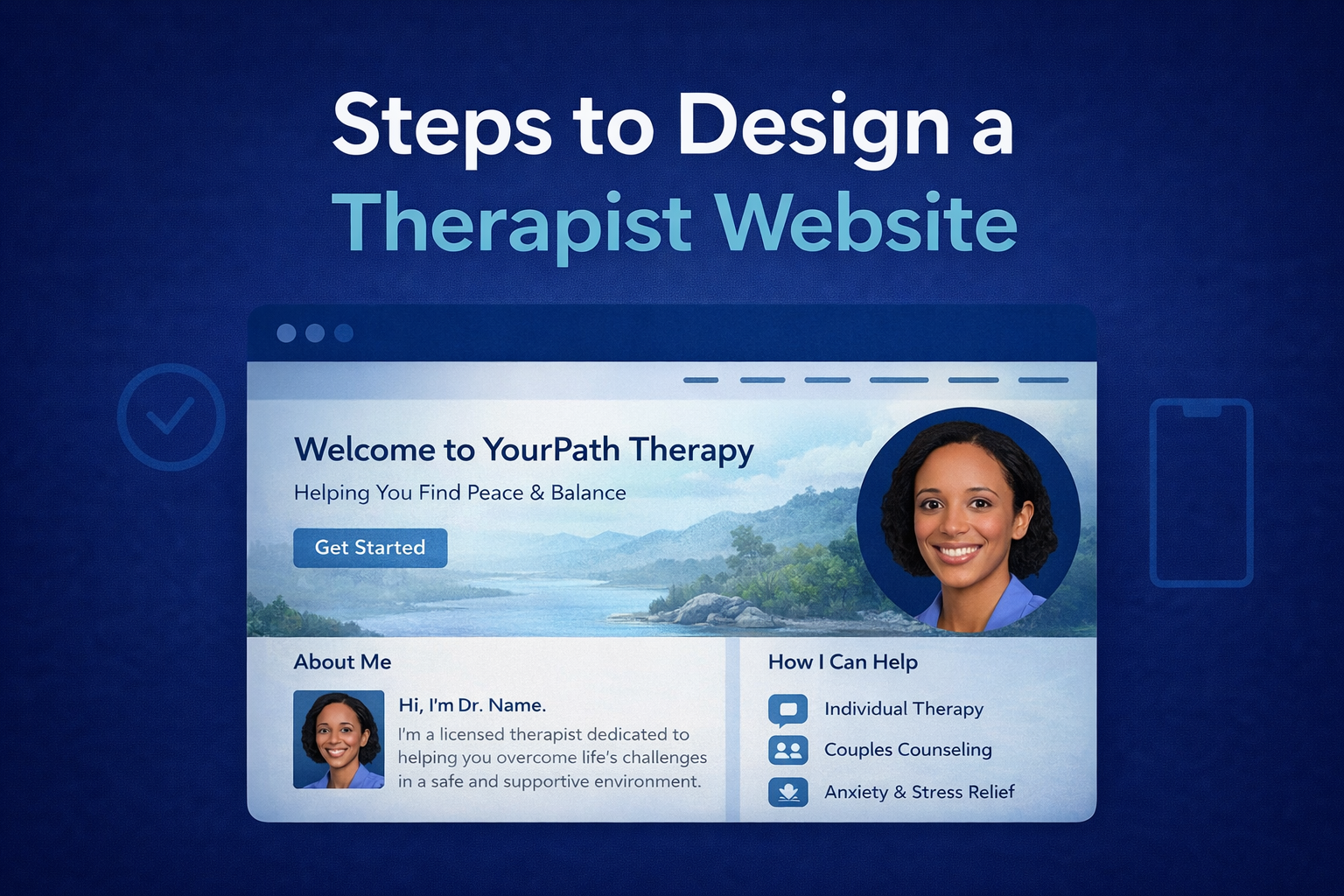Why Local SEO Matters for Therapy Websites
Local SEO focuses on optimizing a website to rank higher in search results for location-specific queries, such as “therapist near me” or “anxiety counseling in [city].” For therapists, local SEO is critical because most clients seek services within their community, often using mobile devices or voice search. Personalizing content enhances relevance, improves user experience, and aligns with Google’s emphasis on Experience, Expertise, Authority, and Trustworthiness (E-E-A-T).
Key benefits of local SEO for therapy websites include:
- Increased Visibility: Rank higher for local searches, capturing clients actively seeking therapy.
- Client Engagement: Personalized content resonates with local audiences, fostering trust.
- Higher Conversion Rates: Targeted content drives inquiries and bookings from nearby clients.
- Competitive Edge: Stand out in crowded markets by addressing community-specific needs.
This guide outlines how to personalize your therapy website content to maximize local SEO impact while ensuring compliance and accessibility.
Steps to Personalize Therapy Website Content for Local SEO
1. Research Local Keywords and Client Needs
Effective local SEO starts with understanding how your target audience searches for therapy services in your area.
- Identify Local Keywords: Use tools like Google Keyword Planner or AnswerThePublic to find location-specific terms, such as “CBT therapist in [city]” or “couples counseling [zip code].” Include long-tail keywords like “best anxiety therapist in [neighborhood].”
- Analyze Client Needs: Research local mental health trends, such as high demand for anxiety treatment in urban areas or grief counseling in communities affected by recent events. Tailor content to address these needs (e.g., “Managing Workplace Stress in [City]”).
- Actionable Tip: Create a list of 10–15 high-intent keywords (e.g., “find a therapist in [city],” “book therapy near me”) and integrate them naturally into your content.
For more keyword strategies, explore local SEO for therapists.
2. Optimize Homepage with Local Signals
Your homepage is the primary entry point for local clients, so it should reflect your geographic focus and expertise.
- Incorporate Location in Headlines: Use H1 and H2 tags like “Trusted Therapy Services in [City]” or “Anxiety Counseling for [Neighborhood] Residents.”
- Highlight Local Expertise: Emphasize your connection to the community, such as “Serving [City] Families Since [Year]” or “Specializing in [Local Issue, e.g., Post-COVID Anxiety].”
- Add Local Schema Markup: Implement structured data (via Yoast SEO or Schema Pro) to include your practice’s name, address, phone number (NAP), and service areas, boosting local search visibility.
- Actionable Tip: Embed a Google Maps widget showing your office location to reinforce local relevance.
3. Create Location-Specific Service Pages
Dedicated pages for each service and location enhance SEO and client relevance.
- Service Pages: Create pages like “Couples Therapy in [City]” or “CBT for Anxiety in [Neighborhood].” Include localized content, such as testimonials from local clients (with consent) or case studies addressing community issues.
- Neighborhood Focus: For practices serving multiple areas, create subpages (e.g., “Therapy in [Suburb 1]” and “Therapy in [Suburb 2]”) with unique content to avoid duplication.
- Actionable Tip: Write 500–800 words per service page, incorporating local keywords and client pain points (e.g., “Stress Management for [City] Professionals”).
For service page tips, see how to write a therapy services page.
4. Develop a Local Blog Strategy
Blogging with localized content engages clients and boosts SEO by targeting community-specific topics.
- Blog Topics: Write posts like “How [City] Residents Can Cope with Seasonal Depression” or “Top 5 Anxiety Triggers in [Region] and How to Manage Them.”
- Community Engagement: Cover local events, such as mental health awareness campaigns or charity runs, to show involvement (e.g., “Join Our [City] Mental Health Workshop”).
- Keyword Integration: Use local keywords naturally in titles, meta descriptions, and body text, such as “mental health support in [city].”
- Actionable Tip: Publish 1–2 blog posts monthly, each 800–1,200 words, linking to service pages and external local resources (e.g., community mental health organizations).
5. Leverage Client Testimonials and Local Stories
Testimonials and case studies build trust and reinforce local relevance.
- Localized Testimonials: Feature anonymized client stories (with consent) highlighting local challenges, such as “A [City] Teacher’s Journey with Anxiety Therapy.”
- Community Impact: Share how your practice supports the local community, like offering sliding-scale fees for [City] residents or partnering with local schools.
- Actionable Tip: Include 2–3 testimonials per service page, ensuring they mention location subtly (e.g., “As a [City] parent, I found therapy life-changing”).
6. Optimize for Voice Search
Voice search is increasingly popular for local queries, especially on mobile devices.
- Conversational Keywords: Target phrases like “therapist near me” or “who is the best counselor in [city]?” that clients use with Siri or Google Assistant.
- FAQ Pages: Create an FAQ section answering local queries, such as “How do I find a therapist in [city]?” or “What is teletherapy like in [region]?”
- Actionable Tip: Use schema markup for FAQs and ensure fast loading speeds with plugins like WP Rocket, as discussed in voice search for therapy websites.
7. Ensure Mobile-Friendly and Accessible Design
Local clients often search on mobile devices, so your website must be responsive and accessible.
- Responsive Design: Use themes like Astra or Divi to ensure seamless navigation on smartphones and tablets.
- Accessibility Features: Add alt text to images, use clear fonts, and support screen readers for clients with disabilities.
- Actionable Tip: Test mobile performance with Google’s Mobile-Friendly Test and optimize images with Smush for faster load times.
For more, see mobile-friendly websites for therapists.
8. Integrate HIPAA-Compliant Features
Personalized content must align with HIPAA to protect client data.
- Secure Forms: Use HIPAA-compliant forms (e.g., WPForms with encryption) for intake or inquiries, embedding local keywords like “book therapy in [city].”
- Encrypted Communication: Ensure client portals and messaging tools use 256-bit AES encryption.
- Business Associate Agreements (BAAs): Verify vendors (e.g., hosting, EHR) provide BAAs for compliance.
- Actionable Tip: Audit your website annually for HIPAA compliance, focusing on secure data handling, as outlined in HIPAA-compliant website tools.
9. Use Google Business Profile Effectively
A Google Business Profile (GBP) is essential for local SEO and complements personalized content.
- Complete Your Profile: Add your practice’s NAP, services, hours, and photos of your office or teletherapy setup.
- Local Keywords: Include terms like “[city] therapist” in your GBP description and posts.
- Client Reviews: Encourage satisfied clients to leave reviews mentioning your location or services, boosting local trust signals.
- Actionable Tip: Post weekly GBP updates about local events or promotions (e.g., “Free Consultation for [City] Residents”) to drive engagement.
10. Monitor and Analyze Performance
Track your local SEO efforts to ensure content resonates with your audience.
- Google Analytics: Monitor traffic from local searches and popular pages (e.g., service pages, blog posts).
- Google Search Console: Track keyword rankings and click-through rates for local terms.
- Actionable Tip: Set up goals in Google Analytics to measure conversions, such as form submissions or appointment bookings, and adjust content based on performance.
Challenges and Solutions for Local SEO Personalization
Personalizing content for local SEO can present challenges, especially for therapy practices. Here’s how to address them:
- Content Duplication: Creating multiple location pages risks duplicate content penalties.
- Solution: Write unique content for each page, focusing on specific neighborhoods or client needs.
- Solution: Write unique content for each page, focusing on specific neighborhoods or client needs.
- Time Constraints: Personalizing content is time-intensive for busy therapists.
- Solution: Use templates for service pages and outsource to a digital marketing expert, as discussed in mental health marketing services.
- Solution: Use templates for service pages and outsource to a digital marketing expert, as discussed in mental health marketing services.
- Privacy Concerns: Local testimonials or stories must comply with HIPAA.
- Solution: Obtain client consent and anonymize identifiable details in testimonials.
- Solution: Obtain client consent and anonymize identifiable details in testimonials.
- Keyword Competition: High-competition keywords like “therapist in [city]” are hard to rank for.
- Solution: Target long-tail keywords and niche terms (e.g., “trauma therapy in [neighborhood]”) to capture specific audiences.
Best Practices for Personalizing Therapy Website Content
To maximize local SEO impact, follow these best practices:
- Focus on Client Intent: Create content that answers local client questions (e.g., “What to expect from therapy in [city]?”).
- Update Regularly: Refresh content quarterly to reflect local trends or community events.
- Engage Locally: Partner with local organizations or sponsor events to earn backlinks from community websites.
- Optimize for Speed: Use caching plugins like WP Rocket to ensure fast load times for local mobile users.
- Maintain HIPAA Compliance: Regularly audit forms, portals, and integrations for security, as outlined in HIPAA-compliant patient portals.
- Leverage Analytics: Use tools like Google Search Console to identify high-performing local keywords and refine content.
The Future of Local SEO for Therapy Websites
In 2025, local SEO for therapy websites will evolve with emerging trends:
- Voice Search Growth: Optimizing for conversational queries like “therapist near me” will be critical, as discussed in voice search for therapy websites.
- AI-Powered Personalization: AI tools will analyze local search data to suggest tailored content, as explored in AI in mental health clinics.
- Hyperlocal Targeting: Focusing on neighborhoods or zip codes will drive ultra-specific traffic.
- Video Content: Localized video testimonials or virtual office tours will boost engagement and SEO.
Therapists should stay ahead by adopting these trends while prioritizing client trust and compliance.
Conclusion
Personalizing therapy website content for local SEO in 2025 is essential for attracting and engaging clients in your community. By researching local keywords, optimizing service pages, leveraging Google Business Profile, and ensuring HIPAA compliance, therapists can boost visibility and build trust. Regular monitoring and updates keep content relevant and effective.
For expert support in local SEO, website personalization, and HIPAA-compliant solutions, visit Mental Health IT Solutions, specializing in digital tools for mental health professionals.







